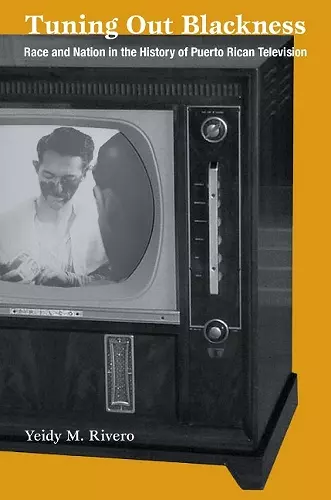Tuning Out Blackness
Race and Nation in the History of Puerto Rican Television
Format:Hardback
Publisher:Duke University Press
Published:6th Jul '05
Currently unavailable, and unfortunately no date known when it will be back

A look at how blackness is represented in entertainment programming in Puerto Rico.
Tuning Out Blackness fills a glaring omission in U.S. and Latin American television studies by looking at the history of Puerto Rican television. In exploring the political and cultural dynamics that have shaped racial representations in Puerto Rico’s commercial media from the late 1940s to the 1990s, Yeidy M. Rivero advances critical discussions about race, ethnicity, and the media. She shows that televisual representations of race have belied the racial egalitarianism that allegedly pervades Puerto Rico’s national culture. White performers in blackface have often portrayed “blackness” in local television productions, while black actors have been largely excluded.
Drawing on interviews, participant observation, archival research, and textual analysis, Rivero considers representations of race in Puerto Rico, taking into account how they are intertwined with the island’s status as a U.S. commonwealth, its national culture, its relationship with Cuba before the Cuban Revolution in 1959, and the massive influx of Cuban migrants after 1960. She focuses on locally produced radio and television shows, particular television events, and characters that became popular media icons—from the performer Ramón Rivero’s use of blackface and “black” voice in the 1940s and 1950s, to the battle between black actors and television industry officials over racism in the 1970s, to the creation, in the 1990s, of the first Puerto Rican situation comedy featuring a black family. As the twentieth century drew to a close, multinational corporations had purchased all Puerto Rican stations and threatened to wipe out locally produced programs. Tuning Out Blackness brings to the forefront the marginalization of nonwhite citizens in Puerto Rico’s media culture and raises important questions about the significance of local sites of television production.
“Tuning Out Blackness offers an astute and very well informed analysis of Puerto Rico’s unique ‘racial’ programming, which in turn provides a valuable look at the deep ambivalence at the heart of the country’s sense of national identity in the shadow of U. S. ideological and cultural power.”—Juan Flores, author of From Bomba to Hip-Hop: Puerto Rican Culture and Latino Identity
“This book not only provides a cultural history of ‘blackness’ in Puerto Rican television, it also locates Puerto Rico as a critical blind spot in both Latin American and U. S. television studies, one that can offer new insights into the televisual representation of race, family, and nation.”—Chon Noriega, author of Shot in America: Television, the State, and the Rise of Chicano Cinema
“[M]eticulously researched. . . . Rivero offers a well-written chronology of the ever-changing function of ‘blackness’ and its relationship to the ‘la gran familia puertoriqueña discourse’ (nationalist discourse) that is perpetually being rearticulated on Puerto Rico. . . . I would highly recommend this book for anyone interested in issues related to popular culture and race and ethnicity.” -- Amanda V. Branker * Journal of American Ethnic History *
“This book contributes a powerful analysis of the dialectics that forge discourses on race and nation in local Puerto Rican televisual productions. . . . Rivero’s book is a well-documented cultural reading of television as an important force in the shaping of localized forms of collective social imagination. This study represents a milestone in media research in Puerto Rico mainly because Rivero’s analysis is articulated from the inside, not the outside.” -- Mirerza González-Vélez * Journal of Communication Inquiry *
“Yeidy Rivero’s Tuning Out Blackness provides a well documented cultural history of “blackness” in Puerto Rican television. . . . [S]he makes excellent use of participant observation, interviews, archival research, and textual analysis to critically analyze representations of race in local Puerto Rican television.” -- Dwight E. Brooks * Journalism History *
"Ground-breaking and complex. . . . Provocative. . . . A rich, engaging, vital contribution to television history and popular culture studies, Puerto Rican and Latino studies, and racial and ethnic studies. Highly recommended." -- S.A. Vega Garcia * Choice *
ISBN: 9780822335313
Dimensions: unknown
Weight: 540g
280 pages